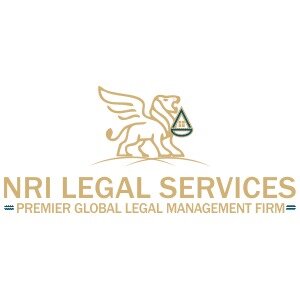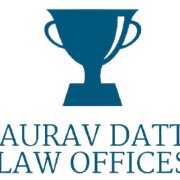Best Conveyancing Lawyers in Chandigarh
Share your needs with us, get contacted by law firms.
Free. Takes 2 min.
Free Guide to Hiring a Real Estate Lawyer
List of the best lawyers in Chandigarh, India
About Conveyancing Law in Chandigarh, India
Conveyancing refers to the legal process of transferring ownership of real estate property from one person to another. In Chandigarh, India, conveyancing encompasses preparing, verifying, executing, and registering documents necessary for property transactions, including sales, purchases, leases, gifts, and mortgages. The process ensures that the buyer secures a clear and marketable title to the property, with all legal formalities fulfilled to avoid disputes or claims arising in the future.
Why You May Need a Lawyer
Conveyancing is a complex legal procedure that involves various statutory requirements, documentation, and compliance with local regulations. You may need a lawyer for the following reasons:
- Verifying the authenticity and marketability of the seller’s title
- Conducting due diligence regarding property ownership, encumbrances, and pending litigation
- Drafting and reviewing agreements of sale, sale deeds, release deeds, lease deeds, or gift deeds as per applicable law
- Arranging for payment of stamp duty and registration fees
- Facilitating the registration process at the relevant Sub Registrar’s office
- Advising on applicable municipal and local development authority norms
- Resolving disputes related to property boundaries, co-ownership, succession, and inheritance
- Ensuring compliance with local bye-laws, building regulations, and land use rules
- Representing clients before authorities if any irregularity or challenge arises
Local Laws Overview
Chandigarh is a Union Territory, and its conveyancing laws are primarily governed by central legislations such as the Transfer of Property Act 1882, the Indian Registration Act 1908, The Indian Stamp Act 1899, and the Real Estate (Regulation and Development) Act 2016. However, Chandigarh also has specific rules and notifications issued by the Chandigarh Administration and the Estate Office, which must be followed during property transactions.
A few key aspects of local laws that affect conveyancing in Chandigarh include:
- Applicable stamp duty rates based on property type and transfer nature
- Area-specific rules and zoning regulations enforced by the Chandigarh Administration
- Mandatory registration of certain documents at the office of the Sub Registrar, Chandigarh
- Verification of no objection certificates, clearance of municipal dues, and adherence to the Chandigarh Building Rules
- Title search requirements to ensure no outstanding liabilities or encumbrances
- Special rules for allotment and transfer of leasehold and freehold properties managed by the Chandigarh Housing Board or other government agencies
It is advisable to consult a local legal practitioner with expertise in conveyancing to navigate these regulations effectively.
Frequently Asked Questions
What is the meaning of conveyancing?
Conveyancing is the legal process by which the ownership of property is transferred from one party to another, involving paperwork, title checks, and registration formalities.
Is it mandatory to register a sale deed in Chandigarh?
Yes. As per the Indian Registration Act 1908, registration of a sale deed is compulsory to validate the transfer of ownership for immovable property valued over Rs 100.
What are the stamp duty rates for property transfer in Chandigarh?
Stamp duty rates vary depending on the nature of the transaction and the gender of the buyer. Generally, it is five percent for women buyers and seven percent for men, with an additional one percent registration fee, but rates are subject to periodic change by the Chandigarh Administration.
What documents are required for conveyancing in Chandigarh?
Common documents include title deeds, tax receipts, approved building plans, sale agreement, identity and address proof, no objection certificates, and encumbrance certificates, along with the sale deed.
How can I verify if the property has a clear title?
A lawyer can conduct a title search at the Sub Registrar’s office to check the history of ownership, pending loans or charges, and legal disputes, ensuring the title is clear.
What is the role of the Sub Registrar in conveyancing?
The Sub Registrar authenticates and records the transaction by registering the property documents, ensuring the deal is legally binding and offering public notice of ownership change.
Can leasehold property in Chandigarh be converted to freehold?
In certain cases, leasehold properties allotted by government agencies such as the Chandigarh Housing Board can be converted to freehold, subject to compliance with official processes and payment of conversion charges.
What happens if I do not register the property documents?
Unregistered property documents do not confer legal title on the buyer, making it difficult to prove ownership and transfer rights in legal proceedings.
How long does the conveyancing process take in Chandigarh?
If there are no outstanding legal issues, the entire process including drafting, stamping, and registration can be completed within two to three weeks. However, delays may occur if documentation or compliance is incomplete.
Should I get a lawyer for conveyancing even for family transfers?
Yes. Even transfers within family, such as through gift or inheritance, involve legal formalities and registration requirements where a lawyer’s guidance is valuable to avoid errors or disputes.
Additional Resources
If you need more information or assistance, you may contact or refer to the following authorities and bodies relevant to conveyancing in Chandigarh:
- Sub Registrar Office, Chandigarh
- Chandigarh Estate Office
- Chandigarh Housing Board
- Revenue Department, Chandigarh Administration
- Punjab and Haryana High Court Legal Aid Services
- Bar Association, District Courts, Chandigarh
- Local legal aid clinics and registered property lawyers
Next Steps
If you are considering buying, selling, gifting, leasing, or inheriting property in Chandigarh, start by gathering all relevant documents pertaining to the property and your identity. Consult an experienced property lawyer to review your documents, verify the title, and advise on the proper course of action. Your lawyer will help draft or review the transaction documents, calculate applicable stamp duty and fees, and accompany you through the registration process at the Sub Registrar’s office. If any disputes or complications arise, your lawyer can represent you before governmental authorities and courts. Choosing a knowledgeable professional early can help avoid legal problems and ensure a smooth and secure conveyancing experience.
Lawzana helps you find the best lawyers and law firms in Chandigarh through a curated and pre-screened list of qualified legal professionals. Our platform offers rankings and detailed profiles of attorneys and law firms, allowing you to compare based on practice areas, including Conveyancing, experience, and client feedback.
Each profile includes a description of the firm's areas of practice, client reviews, team members and partners, year of establishment, spoken languages, office locations, contact information, social media presence, and any published articles or resources. Most firms on our platform speak English and are experienced in both local and international legal matters.
Get a quote from top-rated law firms in Chandigarh, India — quickly, securely, and without unnecessary hassle.
Disclaimer:
The information provided on this page is for general informational purposes only and does not constitute legal advice. While we strive to ensure the accuracy and relevance of the content, legal information may change over time, and interpretations of the law can vary. You should always consult with a qualified legal professional for advice specific to your situation.
We disclaim all liability for actions taken or not taken based on the content of this page. If you believe any information is incorrect or outdated, please contact us, and we will review and update it where appropriate.












